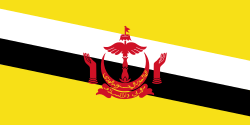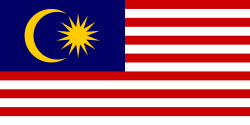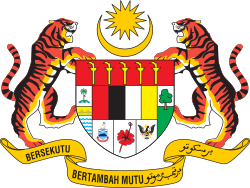| Official name |  Brunei Darussalam Brunei Darussalam |  Federation of Malaysia Federation of Malaysia |
|---|
| Common name | Brunei | Malaysia |
|---|
| Flag |  |  |
| Coat of Arms |  |  |
| Population | 460,345 | 32,730,000 |
| Area | 5,765 km2 (2,226 sq mi) | 330,803 km2 (127,724 sq mi) |
| Population Density | 72.11/km2 (186.8/sq mi) | 92/km2 (240/sq mi) |
| Time zones | 1 | 1 |
| Capital & largest city | Bandar Seri Begawan – 100,700 | Kuala Lumpur – 1,790,000 |
| Government | Unitary Islamic absolute monarchy | Federal parliamentary elective constitutional monarchy |
| Established | 17 September 1888 (Established as a protectorate by the British)
23 November 1971 (Self-government granted from the British Empire)
1 January 1984 (Independence from the British Empire proclaimed for Brunei) | 31 August 1957 (Independence from the British Empire proclaimed for the Federation of Malaya)
16 September 1963 (Proclamation of Malaysia) |
| Predecessor States | Medieval Kingdom Period (1368–1888)
 Sultanate of Brunei (1368–1888) Sultanate of Brunei (1368–1888)
British Colonial Period (1888–1984)
  Protectorate of Brunei (1888–1941; 1946–1984) Protectorate of Brunei (1888–1941; 1946–1984)
Japanese Occupation Period (1942–1945)
 Occupied British Borneo (1942–1945) Occupied British Borneo (1942–1945)
Interim Military Period (1945–1946)
 Military Administration of Borneo (1945–1946) Military Administration of Borneo (1945–1946)
Independent Period (1984–present)
 Brunei Darussalam (1984–present) Brunei Darussalam (1984–present) | Portuguese Colonial Period (1511–1641)
 Portuguese Malacca (1511–1641) Portuguese Malacca (1511–1641)
Dutch Colonial Period (1641–1825)
  Dutch Malacca (1641–1795; 1818–1825) Dutch Malacca (1641–1795; 1818–1825)
British Colonial Period (1771–1946)
 Straits Settlements (1826–1946) Straits Settlements (1826–1946)
 Federated Malay States (1895–1946) Federated Malay States (1895–1946)
 Unfederated Malay States (1909–1946) Unfederated Malay States (1909–1946)
 Raj of Sarawak (1841–1946) Raj of Sarawak (1841–1946)
 Crown Colony of Labuan (1848–1946) Crown Colony of Labuan (1848–1946)
 British North Borneo (1881–1946) British North Borneo (1881–1946)
Japanese Occupation Period (1942–1945)
 Occupied Malaya (1942–1945) Occupied Malaya (1942–1945)
 Occupied British Borneo (1942–1945) Occupied British Borneo (1942–1945)
 Si Rat Malai (1943–1945) Si Rat Malai (1943–1945)
Interim Military Period (1945–1946)
 Military Administration of Malaya (1945–1946) Military Administration of Malaya (1945–1946)
 Military Administration of Borneo (1945–1946) Military Administration of Borneo (1945–1946)
Self–Government Period (1946–1963)
 Malayan Union (1946–1948) Malayan Union (1946–1948)
 Federation of Malaya (1948–1963) Federation of Malaya (1948–1963)
 Crown Colony of North Borneo (1946–1963) Crown Colony of North Borneo (1946–1963)
 Crown Colony of Sarawak (1946–1963) Crown Colony of Sarawak (1946–1963)
Federation Period (1963–present)
 Federation of Malaysia (1963–present) Federation of Malaysia (1963–present) |
| First Leader | Muhammad Shah (historical)
Hassanal Bolkiah (de jure) | Tuanku Abdul Rahman (Monarch)
Tunku Abdul Rahman (Prime Minister) |
| Head of State |  Monarch: Hassanal Bolkiah Monarch: Hassanal Bolkiah |  Monarch: Ibrahim Monarch: Ibrahim |
| Head of Government |  Prime Minister: Hassanal Bolkiah Prime Minister: Hassanal Bolkiah | Prime Minister: Anwar Ibrahim |
| Deputy Leader | Crown Prince: Al-Muhtadee Billah | Deputy Agong: Nazrin Shah of Perak |
| Legislature | Legislative Council (Unicameral) | Parliament (Bicameral) |
| Upper House | none | Senate
President: Awang Bemee Awang Ali Basah |
| Lower House | none | House of Representatives
Speaker: Johari Abdul |
| Judiciary | High Court | Federal Court
Chief Justice: Tengku Maimun Tuan Mat |
| Official language | Malay | Malay |
| National anthem | Allah Peliharakan Sultan (God Bless the Sultan) | Negaraku (My Country) |
| Currency | Brunei dollar (B$) | Malaysian ringgit (RM) |
| National carrier | Royal Brunei Airlines | Malaysia Airlines |
| International airport | Brunei International Airport | Kuala Lumpur International Airport |
| Public broadcasting | Radio Television Brunei | Radio Television Malaysia |
| GDP (nominal) | $13.002 billion ($30,933 per capita) | $800.169 billion ($25,833 per capita) |







